SPOTLIGHT
When kids go hungry: Stellenbosch women fill the food parcel ‘gap’
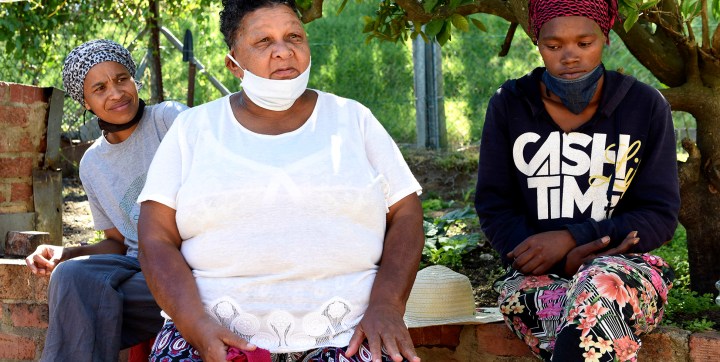
After not receiving any government food parcels, one Western Cape farming community pulled together to provide their own Covid-19 relief. In the fifth article of a six-part series on child hunger, Spotlight spoke to a few women from Elsenburg who have distributed their own food parcels and started soup kitchens to feed hungry children and families in their community.
In the Winelands district of the Western Cape, one community has taken Covid-19 humanitarian relief into its own hands.
Throughout the lockdown, residents of the small farming community of Elsenburg outside Stellenbosch watched on their television screens how people in the more urban areas fought for government food parcels. Community members say they never got any of these parcels.
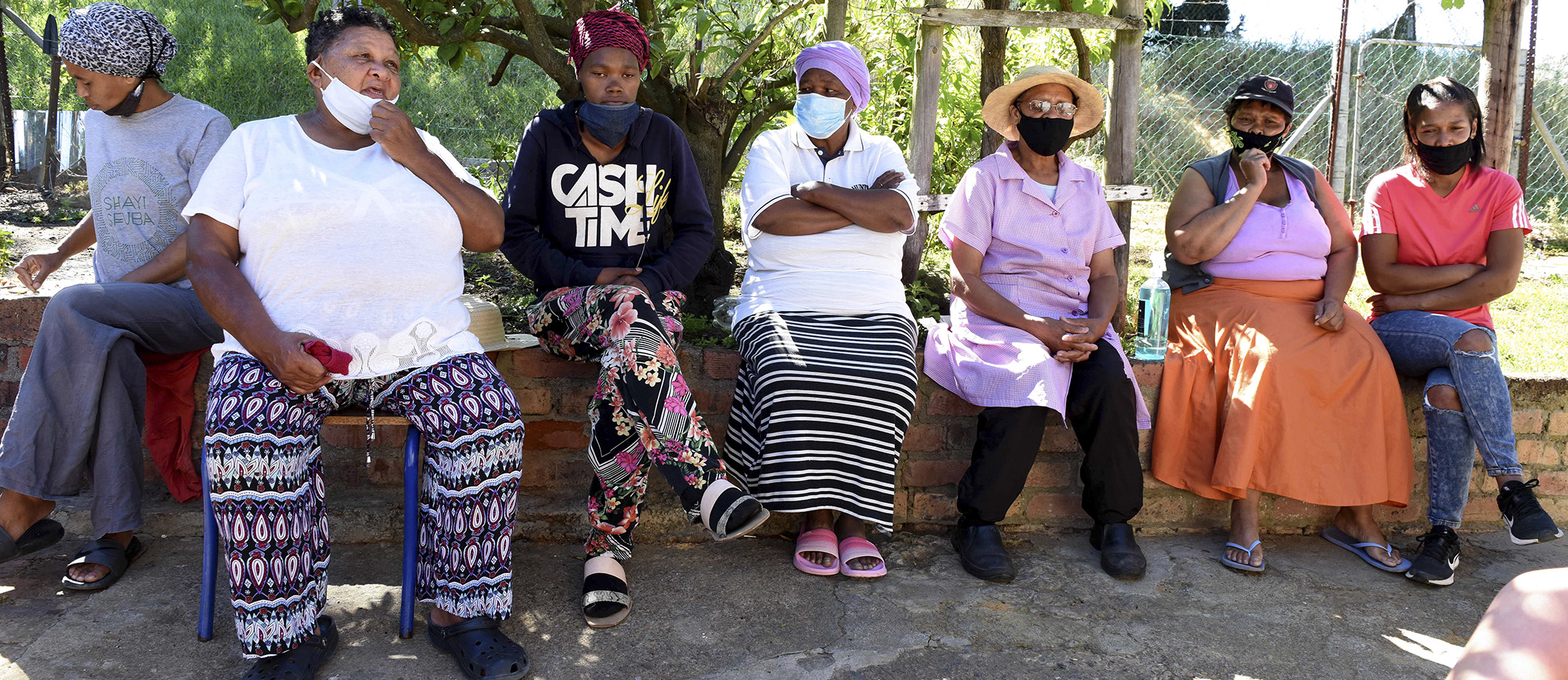
After not receiving any government food parcels, farm worker women in Elsenburg in the Winelands region of the Western Cape pulled together to provide their own Covid-19 relief. (Photo: Nasief Manie / Spotlight)
So, a local community organisation, Ubuntu Rural Women and Youth Movement, stepped up and took action. The organisation provided food parcels and meals to the most vulnerable in their own and neighbouring communities.
During the hard lockdown, many women in this community lost their jobs as farm workers, but did everything in their power to shield their children from facing extreme hunger.
Ouma Magrieta van Rooyen is one of them. As the summer sun beats down on the brick houses of the small farm community, her smile spills over the upper corners of her mask. She tells Spotlight about a young boy who goes door to door asking for food, but as the lockdown got longer, his meal requests became more specific. If she gave him bread with jam, he wanted it with peanut butter; she says laughing. Or if she gave the bread with peanut butter, he had the cheek to ask for cheese and tomato. No matter the case — be it jam or peanut butter — Van Rooyen like the other women in this community, always ensure that the children are fed.
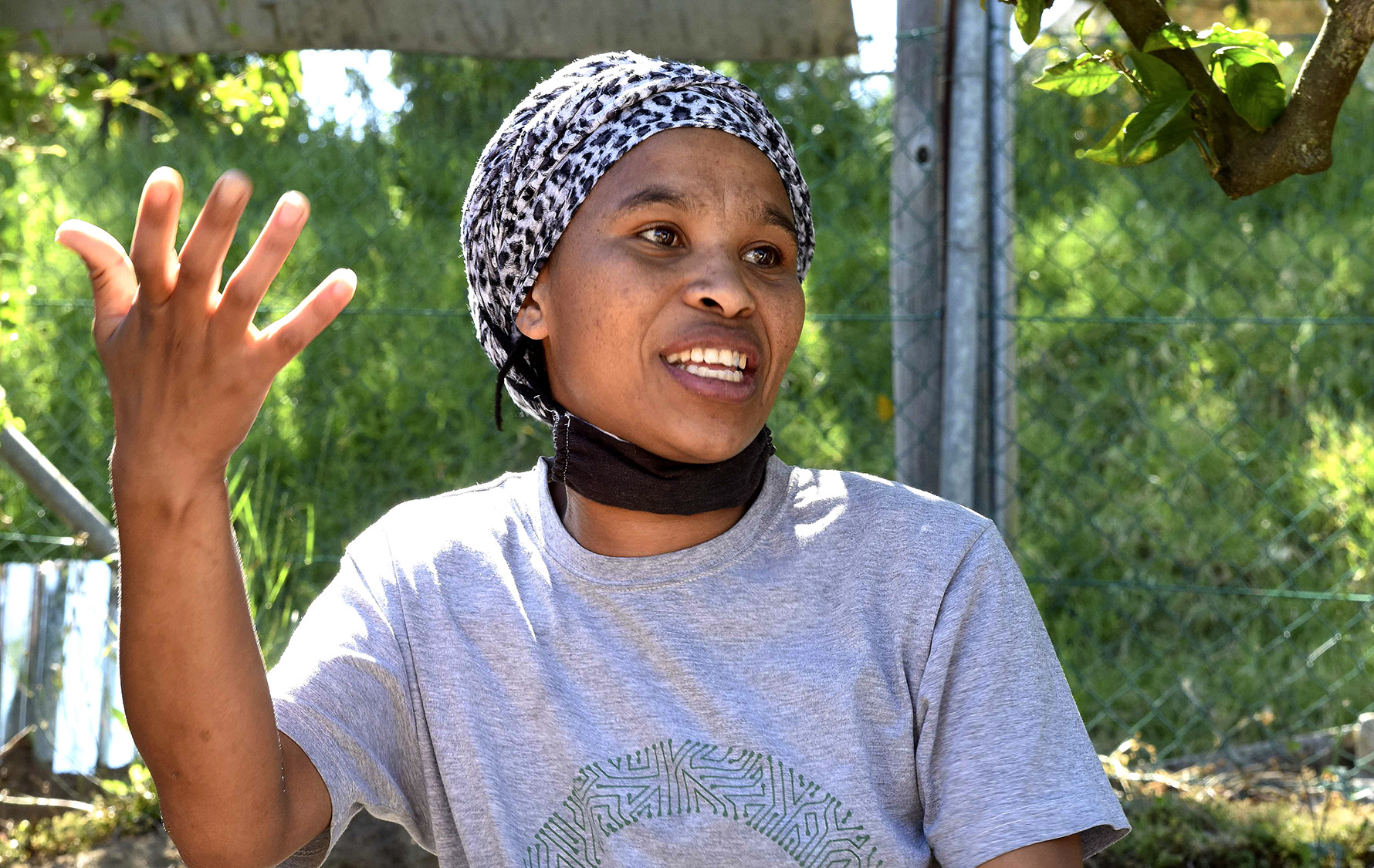
Alvira Erasmus is an unemployed mother of three. (Photo: Nasief Manie / Spotlight)
“Any mother would,” exclaims Alvira Erasmus, an unemployed mother of three.
These women are the strongholds of Elsenburg, says Wendy Pekeur, Ubuntu Rural’s coordinator and founder. The organisation distributed food parcels to vulnerable households and established several soup kitchens and food gardens. They started the gardens recently as part of the community’s long-term plan for food sustainability, or “sovereignty”, as Pekeur prefers to call it.
Pekeur and the women of Ubuntu Rural distributed more than 1,000 food parcels throughout the Winelands area, an intervention that was made possible through small bits of outside funding and Pekeur’s own pocket.
“Government didn’t even bother to bring food parcels,” says Erasmus. “If it wasn’t for Wendy, we wouldn’t have survived.”
Strict criteria for government food parcels
According to the Western Cape Department of Social Development, 10,564 government food parcels were distributed in the Winelands region between April and October. It is not clear if any of this reached the Elsenburg community, because the department did not respond to specific question about this. The department, however, said that their food relief programmes prioritised (but were not limited to) people who were not receiving any other form of state assistance, such as grants.
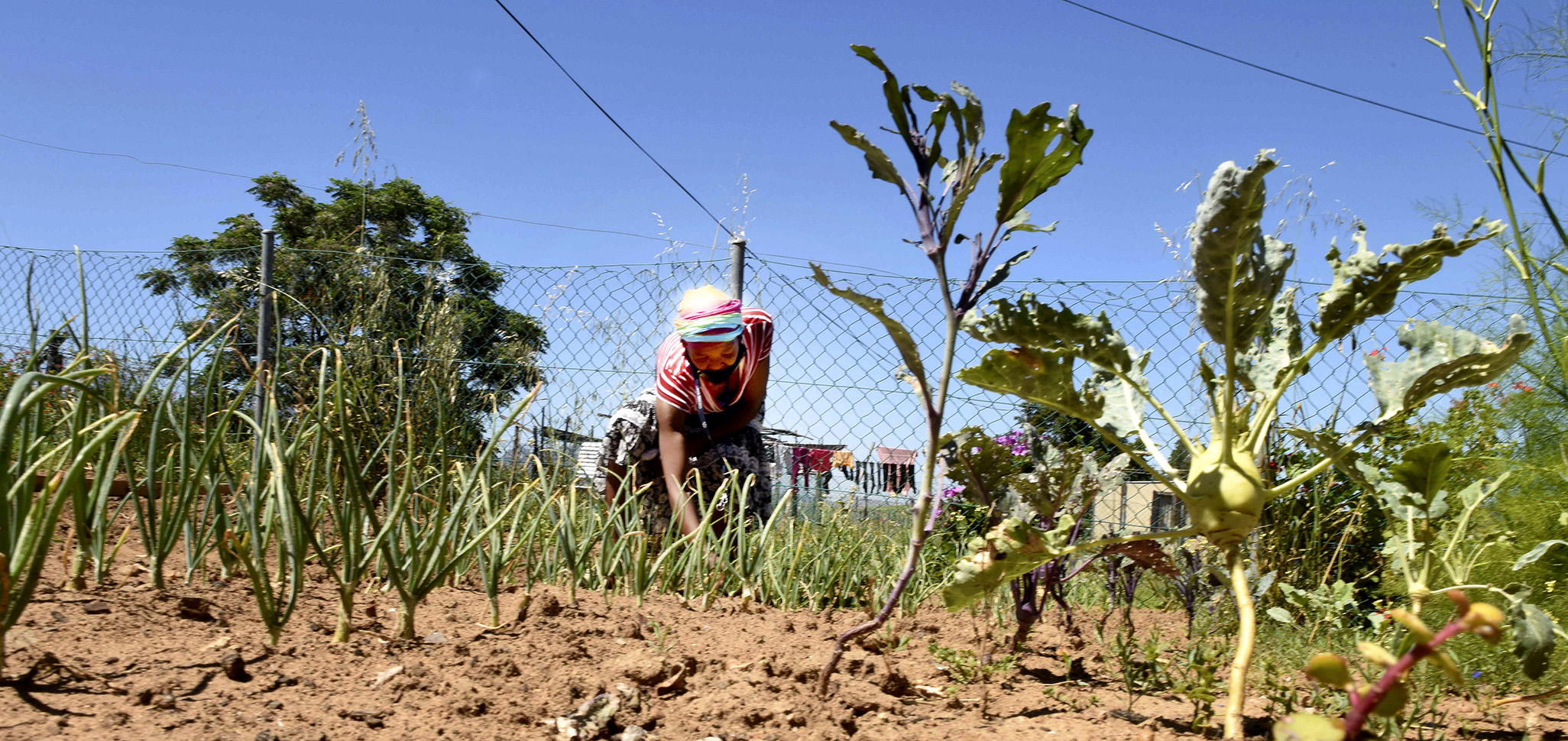
Clara Davids in the Elsenburg community food garden. (Photo: Nasief Manie / Spotlight)
Provincial spokesperson Joshua Chigome says that providing emergency food relief during the pandemic goes beyond the usual interventions and legislative mandate of the department.
“The distribution of what was initially 50,000 food parcels, is provided once-off to support a family of four for one month during the lockdown and is based on set criteria to ensure that this limited number of food parcels reach the most vulnerable people. We must add that this initiative is not there to replace, but rather serves to supplement other initiatives implemented by Sassa (South African Social Security Agency), NGOs, local government and national government during the Covid-19 lockdown,” he says.
Chigome says that families in need of food parcels were requested to apply for them by calling a call centre. The requests that were received were then assessed by the department based on a set of criteria.
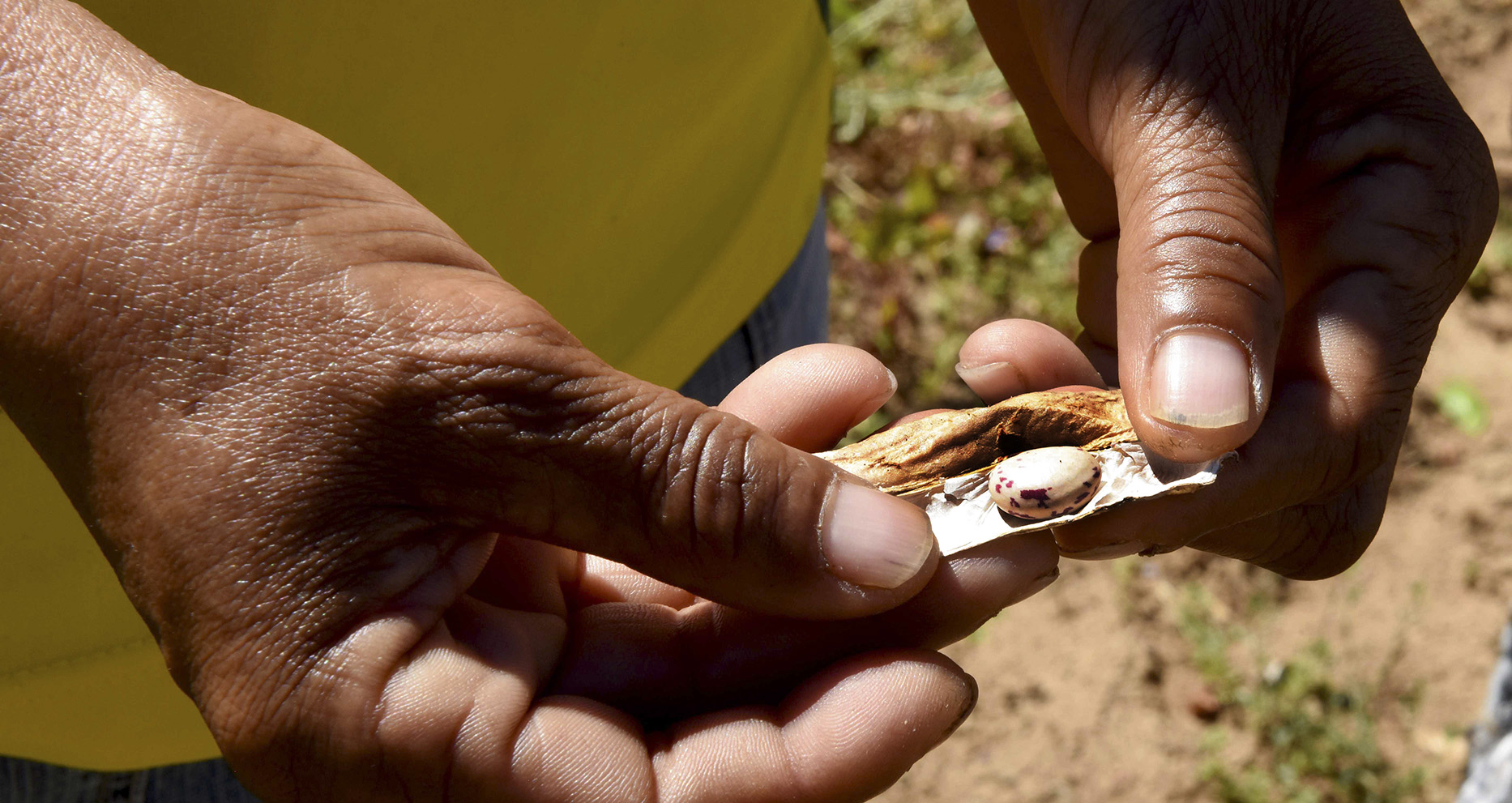
After not receiving any government food parcels, farm worker women in Elsenburg in the Winelands region of the Western Cape started gardens and used the produce to run soup kitchens to feed the community in Elsenburg and surrounds. (Photo: Nasief Manie / Spotlight)
The criteria included families who had been affected by Covid-19 such as a family member who had tested positive and was quarantined in their home, or if a family member tested positive and could not sustain themselves. Other criteria included those with chronic illnesses who could not sustain themselves and had been referred to the department for food parcel relief by a clinic or health practitioner.
A final criterion was for people or households who had insufficient means to sustain themselves during the lockdown period who were referred by a registered humanitarian relief agency, registered NPO or a municipal manager, and assessed by DSD (Department of Social Development), said Chigome. “In this instance, persons not yet in receipt of Sassa grants, including the elderly, child-headed houses [and] grant awaiting beneficiaries will be prioritised.”
Elsenburg’s own food parcels
In Elsenburg, the group of women carefully selected families who would get their non-government food parcels. This included single mothers, families with children and those who were unemployed or did not receive a grant. The parcels contained kitchen staples like maize meal, rice, beans, tinned fish, oil and a vegetable such as butternut, but fresh fruit, spices and soup powders had to be purchased separately, says Pekeur.
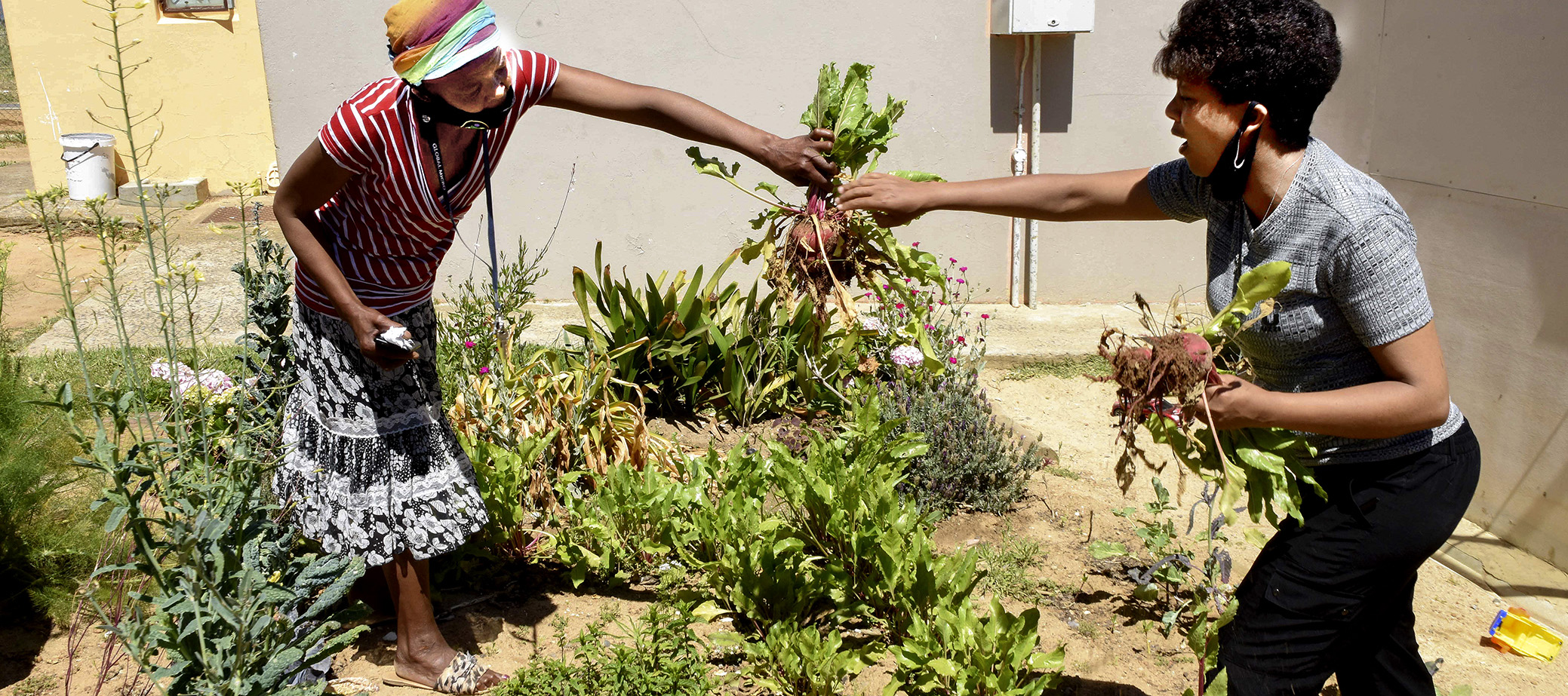
Clara Davids helps Wendy Pekeur pick beetroot from Pekeur’s small garden. (Photo: Nasief Manie / Spotlight)
Despite living on a farm, this community seldom sees any fruit, says Pekeur. During lockdown, Pekeur says she picked oranges from some trees near the Cape Town airport. These rare treats were distributed to children and older people to help boost their immune systems.
Food parcels as a fundamental intervention
During the lockdown and pandemic, food parcels are one of the best ways to address hunger and nutrition needs in households. In a time of crisis and severe food shortages, and in South Africa where many people do not have the means to buy food, there is an imperative to provide food aid, says Dr Chantell Witten, a lecturer at the University of the Free State’s Faculty of Health Sciences. Witten is also Nutrition Lead for the South African Civil Society for Women’s, Adolescents’ and Children’s Health (SACSoWACH, a civil society group advocating for the health of newborns, children, adolescents and mothers).
“It is a human rights violation, especially when we know that women are ‘shielding’ their children and their families from hunger. In this way, breastfeeding mothers who have other children are bearing the brunt of feeding their breastfeeding child and sacrificing food to feed her other child/ren. We also know that pregnant mothers need additional nutrients and poor nutrition during pregnancy will have long-term effects on their children’s health and social development, into their children’s adult years,” says Witten.
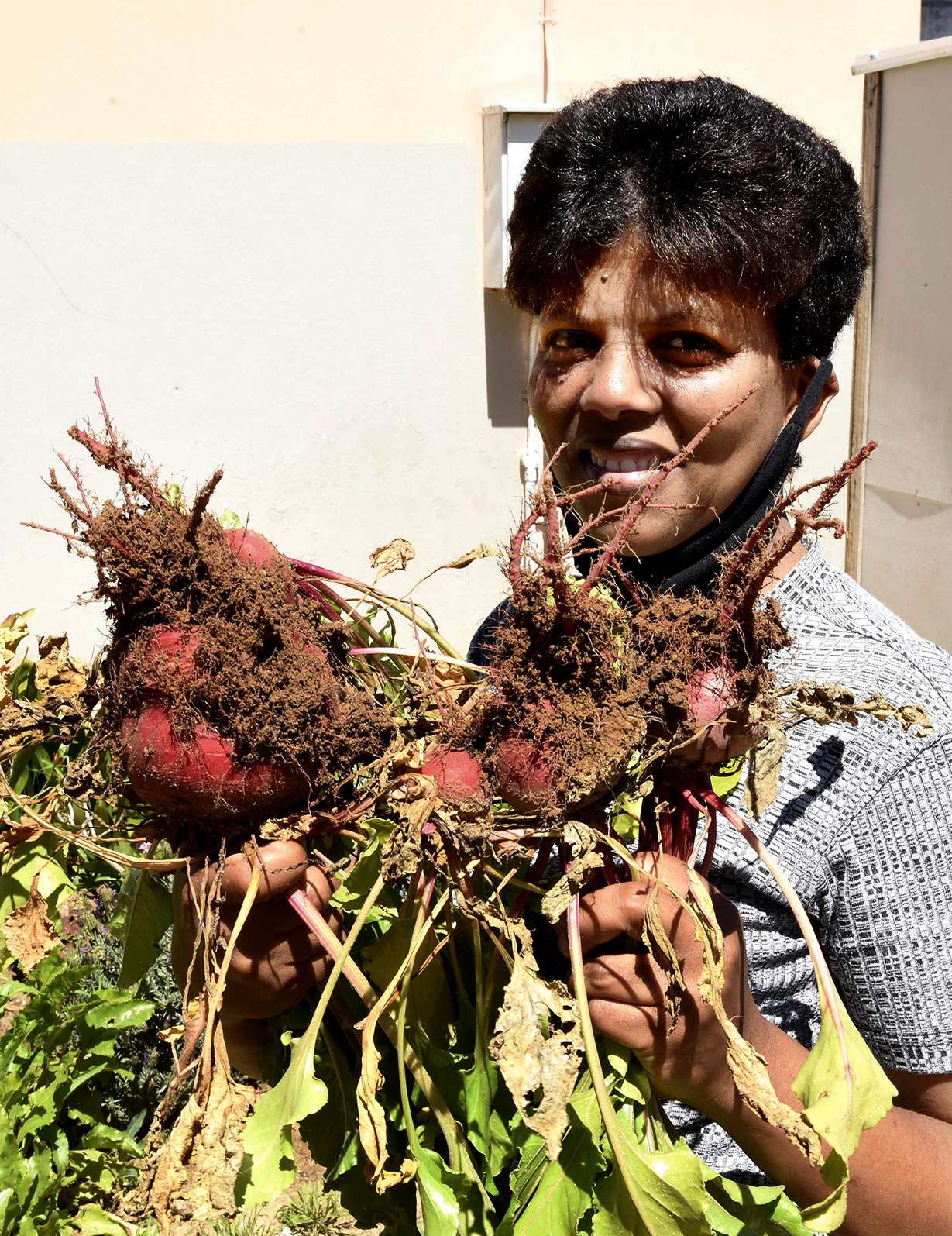
Wendy Pekeur, founder of Ubuntu Rural Women and Youth Movement, with her proud harvest of beetroot from her garden. (Photo: Nasief Manie / Spotlight)
Providing food parcels is one challenge, but making sure they contain adequate nutritional content is another, especially when fresh fruit and vegetables are more expensive than starch staples like maize meal. Witten says to improve the nutritional content of food parcels, particularly for breastfeeding mothers and young children, they should contain staples such as fortified maize meal, flour, rice and oats, as well as legumes including split peas, dried beans and lentils. The parcels should also contain tinned fish, powdered milk and multiple micronutrient supplements or powders to add nutritional value to basic foods.
Witten also suggests that food parcels could contain vouchers that are linked directly to food producers, that would allow recipients to get fresh vegetables, fruit, eggs and meat.
In the Western Cape, the government food parcels contain rice, maize meal, cake flour, sugar, cooking oil, salt, peanut butter, rooibos tea, milk powder, samp, baked beans, lentils, beef stock, yeast, soap, soup mix, jam and tinned mixed vegetables.
Chigome says the department will continue providing a safety net for food insecurity through existing programmes such as the early childhood development (ECD) sector, older persons, disability and child and youth care centre programmes.
“We have made available R4-million to support 100 community-based kitchens and R10-million to create work opportunities to provide a safety net for vulnerable families,” Chigome says.
Making food parcels child-friendly
Spotlight also spoke to a few young reporters from Red Cross War Memorial Children’s Hospital’s RX Radio, a radio station by and for the children at Red Cross. The children have their own ideas about food parcels. They want food parcels with more fruit and vegetables to keep kids healthy and build strong immune systems. There should also be smaller parcels that children receive at schools so they can carry them home, they say.
“Children need nutrition [from] fresh vegetables and fruit. People can make a healthy cooked meal with the vegetables. They can even give vitamin tablets [in the food parcels] to boost the immune system a bit. When you do not eat a proper meal, you feel weak and that will be of great help,” says 15-year-old Saadiq.
“They should make smaller-sized parcels that can be delivered at the children’s schools so that it is more accessible for them and easier to carry home,” adds 11-year-old Naseerah. Previously, Spotlight reported that civil society organisations were pushing the Department of Basic Education to provide food parcels to learners to ensure learners were fed on days that there was no school, and the weekends. So far, Mpumalanga and the Northern Cape are the only two provinces to have implemented this measure.
Saadiq says that while food parcels are effective, some people do not have electricity or gas to cook at home, and that the government needs to consider this challenge. This is one issue the Elsenburg community also faces. During the hard lockdown period the community had little gas to cook, says Pekeur, so the women had to collect wood to cook outside.
The fruits of their labour
Meanwhile, back in Elsenburg, Clara Davids takes Spotlight to the community’s newly established food garden. Among the women, Davids is the one with the “green fingers” and when she is not tending to the garden, she is cooking and serving food in the soup kitchens.
“Making food for hungry people makes my heart sing,” she says, smiling.
The bounty in the garden is impressive and includes beetroot, broad beans, wild garlic, fennel and kohlrabi (a vegetable similar to a turnip) — all growing steady. The women had their first small harvest recently, setting them up with enough fresh beetroot to supply the soup kitchens for about another month.
Davids proudly pulls an unusually large beetroot from the soil. The trick is to plant them far apart from one another, she says, to give them space to grow.
Government solutions
The provincial department will continue to provide food relief through its existing food relief programmes that include 92 Community Nutrition and Development Centres (CNDC), says Chigome. Currently, the closest CNDC to Elsenburg is roughly 14km away in Kayamandi, Stellenbosch.
“We will also support from November 2020 to March 2021 an additional 100 community-based kitchens. If more funding is made available, the department will consider the efficiency and cost-effectiveness of food relief mechanisms and implement accordingly.”
Adding to this, previously Spotlight reported on the Western Cape health department’s Covid-19 response plan to address maternal and child health and nutrition. The plan can be found here.
“In crises, we need food aid and feeding centres,” says Witten, “then development approaches like food for work, food gardens and homestead food production. All these should always be coupled with food and nutrition education,” she says. DM/MC
When kids go hungry is a six-part series looking at the effects of the Covid-19 pandemic and lockdown on the nutritional status of children in South Africa. This series is supported by Media Monitoring Africa as part of the 2020 Isu Elihle Awards
This article was produced for Spotlight – health journalism in the public interest. Sign up for our newsletter.





















 Become an Insider
Become an Insider
Comments - Please login in order to comment.